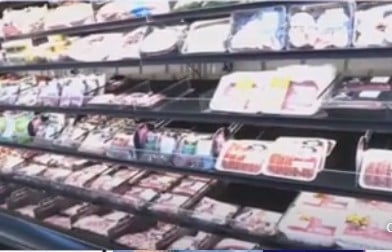Given the arrogance of Those Who Know Best in their attempt to control, of all things, a pandemic, do you think they’ll do better when Americans start paying astronomical prices at the grocery store?
Or begin to go hungry?
We’re heading in that direction.
With the elites poking at the Russian bear and trying to get us into World War III but in a way where they think none of us gets hurt, we are now facing food shortages.
That could mean possible monthly grocery costs rising by $1,000.
It’s the beginning of crop planting time. Crops need fertilizer. And through the brilliant mechanisms of globalism, guess where we get a lot of our fertilizer?
Russia. They provide two-thirds of the world’s supply, according to Fox’s Laura Ingraham.
And they’re temporarily shutting down their fertilizer exports.
So there’s one more log being added to the out-of-control inflation fire.
You already know about that fire when it comes to food — those prices are up by 7 percent year-to-year as of January, according to the U.S. Bureau of Labor Statistics.
And that new fertilizer inflation log is a big one — enough, maybe, to set the whole house ablaze.
“We’re going to get hit on every front, on every expense possible,” Oklahoma farmer Ben Neal told Ingraham, “From fertilizers to fuel to labor, insurance – everything in between [including] our packing supplies.”
Neal’s farm operates on a farm-to-market business model, so he has direct fuel costs for transportation. But every farmer essentially faces the same thing – crops need to be transported to processors and final markets and there are increasing fuel costs to power the trucks, trains, barges and ships that make that happen.
But that’s the harvest. Right now there’s the problem of planting the crops in the first place, with their attendant fertilizer.
Already experiencing inflation, Neal predicts fertilizer will drive his costs up by about 25 to 30 percent, “And I think that will soon be reflected at the grocery stores … on top of what we’re already seeing.
“These fertilizer prices haven’t really affected the grocery store prices yet. They will start coming this summer,” according to Neal.
Farmers are at the bottom of the food-supply pecking order, subject to commodity pricing outside of their control. And costs further along the supply chain for processing, packaging, transporting, distributing and general retailing may have their own inflation issues which bump prices beyond the 25-30 percent fertilizer cost increases Neal predicts for his farm.
So with costs for fuel and everything else going up, there’s no telling where prices will end up without Russian fertilizer.
But some good may come about — people may no longer be able to afford chips, ice cream and other junk and may have to turn to healthier selections of fruits and vegetables.
As with earlier generations, hunting and fishing may come to be about more than recreation and sport.
And another thing: With food rationing during World War II, what did people do? They planted victory gardens.
We could plant a new generation of victory gardens, named for anticipated triumph over the short-sightedness of the elites who get us into these messes.
Which means that the peace sign people like to flash may return to its original meaning — victory.
This article appeared originally on The Western Journal.


